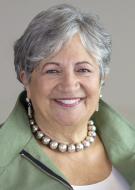
With a commitment to achieving 100 percent clean energy by 2045 amongst other bold climate targets, Los Angeles—and California as a state—is a leader in its support for the green economy. At the Veloz Forum on November 6, 2019, Mary Nichols, chair of the California Air Resources Board, gave her remarks on the state’s ongoing regulatory battles with the federal government over the California's efforts on air quality and climate action, as well as her confidence that—with the right support—electric vehicles will continue to drive markets and innovation to fuel the clean energy economy.
If you're following the news, you know that we are under siege, in some respects, as a result of our disagreements with the Trump administration about California’s climate program and whether we can have a climate program at all. I'm pleased to say that not only do we but we have unanimity on the part of our legislature and our governor, and commitment on the part of the entire state and many of our cities including the city of Los Angeles. They have been a real leader among cities and have a mayor who is a leader among mayor's in continuing to insist that this is the quintessential environmental issue of our time, that we are going to take action, and continue to take action. However, we need to do it.
These people and these organizations that you see before you are all heroes. They're all active by virtue of being a part of being a part of Veloz. You might notice that some organizations who are listed out there are both supporters of Veloz and working with us on this really remarkable—in fact, as far as I know—unique, voluntary program to promote a successful electric zero emission vehicle market. And yet, at the same time, there's at least one can I recognize there and maybe more, who are actually suing us at the same time.
It's important to recognize that it's a transitional time, because part of our society and part of our economy is still stuck in the old way of doing things, and part of that is not. It's kind of painful to realize that—especially to be in a position like mine—where we're here celebrating progress and working to find ways to accelerate the movement to electric vehicles. And at the same time, we're fighting in federal court over whether California has the right at all to be doing what we're doing.
I just want to say that we can all learn to do two things at the same time and maybe think even too inconsistent thoughts at the same time. We're going to continue to fight, we're going to continue to litigate, we believe we're going to win. We're very sad that we have to be in that position, but we do what we have to do as we have for decades now. And at the same time, we're going to model new and better ways of doing things, which include being part of Veloz. For those of you who are here this morning, each and every one of you individually, I want to thank you for being here and for what you're doing.
I'm so old, I'm not even a boomer. Recently, the latest thing to say is ‘okay boomer’ to some stupid older person…[inaudible 10:04]…pay any attention to because we all know that the future is being brought to us by people of Gen Z and beyond. But at the same time, we didn't get here without a struggle. The fact that we have the wonderful vehicles that we have today is in considerable part due to the fact that California—asserting its authority and overcame litigation and political opposition at the highest level over a period of years—eventually won on our right to set a zero emission vehicle standard as part of our overall air quality program. Our air is cleaner as a result of that, we know it is. Anybody who grew up here or who moved here even 10 years ago, knows that it is. Yet at the same time, we continue to have to refight some of the same old wars. But hopefully, we'll get it right at some point and break through that cycle and being able to move on.
I want to say that we're committed as we are to the success of the zero emission vehicle, and that includes a commitment to pushing in every way we can, including through incentives. We want to make sure that we're also trying to move the industry as a whole in the direction of where they need to go, so it isn't enough to just sit back and rely on the fact that it's inevitable that the electric vehicle is going to succeed. It may be inevitable, but if it’s 50 year from now, that's not good enough. If it happens even a decade from now, it's not good enough. We have got to start moving further, faster, and more effectively than we have before.
One of our major partners in that has been the electric utilities in the state of California who understood and persevered early on in a vision of electrification for our transportation system. They recognized that there's possibly a tremendous synergy between what they have historically done in terms of providing infrastructure that allowed for our cities to exist and to grow, and the potential for what they could be in the future as their market changes just like everybody else's is changing. Being able to recognize what's coming as inevitable, but also then to seize upon it and help make it happen is the is the key to all of this.
